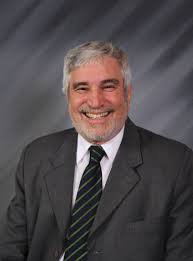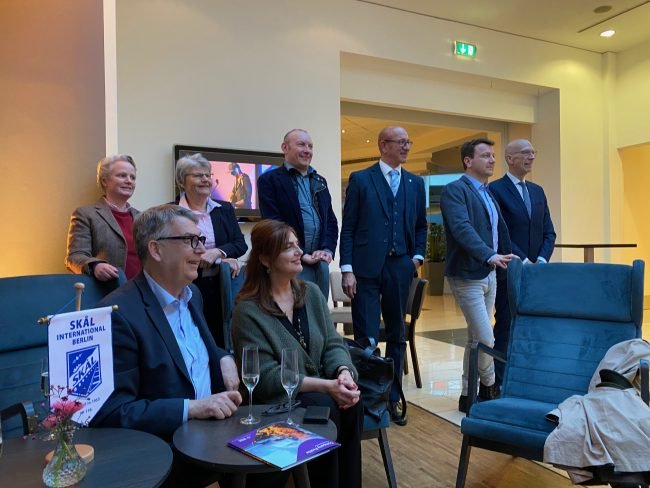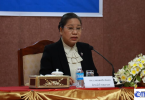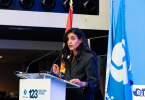Traveling during Coronavirus? No more? The global travel and tourism industry is in a state of panic, disbelieve and business is in a downward freefall due to the outbreak of Coronavirus. What should be the response of the travel sector? This was discussed today in Berlin, Germany.
ITB Berlin 2020 was canceled, but SaferTourism didn’t take no for an answer and after meeting with SKAL on Wednesday continued with their planned discussion on coronavirus at the Grand Hyatt in Berlin.
Today representatives from the Tourism Authority of Thailand, and participants from Israel, Ukraine, France, Germany, Netherlands, and the USA (Texas, Hawaii) met at the Grand Hyatt Berlin for an informal discussion. The meeting was supported by eTurboNews, PATA, African Tourism Board and LGBTMPA.
Dr. Peter Tarlow, head of Safer Tourism presented his views saying:
Only a few short months ago, the world first heard about a possible new and deadly virus called the Coronavirus (CoVid-19). In these last few months what at first appeared to be a few isolated cases of an unknown form of influenza in a faraway province of China has now turned into a worldwide pandemic that threatens not only human life and wellbeing but also major portions of the tourism industry and economies around the world. For example during the last week of February world stock markets plunged, in many locations hotels emptied, airlines and cruise lines have canceled voyages and stopped visitations or landings at multiple ports-of-call.
This contraction of the airlines’ industry has caused numerous tourism and travel companies now to lay off workers creating still additional economic hardships. Air and seaports now reject passengers from the most infected locations or force them into quarantine. Medical personnel from around the world are scrambling to find new vaccines; trying to stop the disease’s spread and possible mutation. Fears often provoked by emotions have caused runs on supermarkets and on facemasks, and even shortages of toilet paper.
The World Health Organization has declared the Coronavirus to be a worldwide crisis and the United States’ government has now earmarked almost eight billion dollars to fight the disease. Around the world, governments have closed borders and prepared quarantine centers. Even Saudi Arabia has stopped pilgrimages to its holy cities.
Perhaps no industry has been hurt as much as the travel and tourism industry, especially that part of the industry that deals with the leisure traveler. The travel and tourism industry depends on visitors being able to travel freely from one location to another. When a health crisis occurs, especially one for which currently there is no vaccine, visitors naturally become afraid. In the case of the Coronavirus, not only has the Chinese government now taken action but much of the world has also acted. Nations around the world have restricted or forbidden their national carriers to fly to China. Other nations have closed their borders or demand health records before allowing foreigners to enter. Depending on how the virus mutates, spreads, the consequences of these cancellations might last for years. The results are not only a loss of money but also prestige and reputation. Many parts of China already suffer from a perceived lack of hygiene and the spread of this virus has made a bad situation appear even worse.
Additionally, the tourism industry must survive in the age of twenty-four, seven-day-a-week worldwide news. The result is that what happens in one location around the world is almost instantaneously known throughout the entire world. Media pressure not only means that individuals will shy away from such locations but also that local governments throughout the world feel obliged to take added precautions, so as not to suffer reputational or political consequences. From the perspective of tourism, a health crisis quickly becomes a tourism crisis.
Public health officials, doctors, and scientists are still unclear as to the science behind the CoVid-19, although with the release of information by China scientific breakthroughs are on the horizon. Both Israel and the United States believe that they are on the verge or developing mass vaccines, but vaccines need to be tested before they can be released and will have to be updated as the virus mutates. What medical personnel do know is that this virus is related to a number of ailments that have plagued humanity for centuries. From the common cold to multiple strands of influenza and the S.A.R.S. virus, a virus from the early part of the twenty-first century that had devastating effects on tourism in such places as Hong Kong and Toronto, Canada. Concerning the CoVid-19 (Coronavirus), we know that it is spread from one human to another or from the touching of infected surfaces. What health officials still do not know is if those carrying the disease are aware that they are carriers or not. The fact that large numbers of infected people might be carriers without knowing creates whole new problems for both the medical and for the tourism industry.
The fact that we still do not have a clear understanding as to how the Coronavirus spreads or mutates can become the basis for both rational and irrational behavior. In fact, the economic panic caused by the fear of the virus might be as destructive or more destructive than the virus itself.
This fear and at times irrational behavior should not come as a surprise. The German philosopher Hegel long predicted that as science grows, so do irrational fears. Many cultural and religious traditions have long known that negatives and positives often offset each other. In some cultures, this is called the ‘yin and the yang”, in Hebrew culture it is called the Yetzer ha’Ra and the Yetzer ha’tov (the evil and good inclination found in each human being). Risk management also understands this principle of opposites although it is less poetic. Risk managers call this principle the “law of unintended consequences” and recognize that life is two-sided and often what we believe to be a positive might also have negative and unintended consequences or vice versa.
The law of unintended consequences is no strange to the world of tourism. Tourism specialists have long recognized that what they believed to have been purely positive later is discovered to have produced negative consequences along with the positive results. The onset of CoVid-19 might hold multiple consequences for the tourism industry and it is essential that industry leaders recognize these consequences and prepare for a world in which rapid travel not only unites us but also allows for the spread of multiple pandemics.
The tourism industry may feel both localized and large scale travel reluctance by large numbers of people. This reluctance to travel could result in some, or all, of the following:
- Fewer people traveling. This reduction will hurt those working in the travel industry but might also help tourism develop sustainable and ecological models for the future,
- Decrease lodging occupancy resulting not only in loss of income but also jobs. This decrease, however, might force the lodging industry to reexamine its sanitation and health guidelines, provide improved cleanliness and assure that all who are working in the lodging and food industries have adequate health and absenteeism protection.
- Loss of reputations and confidence on the part of the traveling public might also result in decreased taxes and with governments having to find new revue streams that do not overly tax travelers.
The tourism and travel industry can use the fear and economic turndown as a way to face endemic problems and alter policies that have long needed updating.
Just as in the case when the tourism industry faced major paradigm changes after the September 11th terrorism attacks in 2001, it is wise for government and industry leaders first to review and remember some of the basics when dealing with a tourism crisis and then consider what changes needed to be made so as to recover from the current pandemic and to be prepared for the next. Among principles are:
-Be up-to-date. In a world of rapidly changing medical news and political decisions, tourism leaders need real-time and accurate information. Consult multiple news sources on a regular basis. Governments are reacting quickly and decisively to quarantined problems and stop them before potential problems become worse. This means that all tourism professionals, including hoteliers, restaurant owners, and attraction managers need to have alternative plans in case borders are closed, flights or cruises are canceled, or new illnesses develop.
-Develop in conjunction with government officials special emergency funding situations. Many tourism businesses live on very short margins. Make sure that in case of an economic downturn, there is a way to keep small tourism businesses afloat during difficult economic times that are beyond their control.
-Avoid falling into wishful thinking patters. All of us often tend to believe what we want to believe. Tourism officials will need to make decisions that are based on facts and not on desires. In times such as these clear precise planning and thinking not only saves lives but produces economic viability.
-Develop the best responses possible. To accomplish this task, tourism officials meet regularly with medical and public health officials, work with tourism policing units and know what the law allows and does not allow. It is for this reason that the tourism sector needs to Create as many alliances as possible between the government sector, the medical sector, and tourism organizations. Create ways that you work with the media to get real facts into the public and to prevent unnecessary panic.
-Remember that tourism and travel are highly vulnerable to a panic situation. This is not the first time that the tourism industry has faced crises. The 1959 flue, the S.A.R.S. virus, H9NI virus were all challenges to the tourism industry. These medical emergencies ought to remind the tourism industry that leisure, and even business travel, are choices and no obligations. When travelers become afraid they simply cancel their trips. These trip cancellations often result in massive layoffs of tourism workers whose jobs suddenly disappear.
-Have flexible cancellation policies in place. This might be especially important for tourism group organizers and travel agents. Make sure that you share this information with clients and have full refund policies in place should they be needed.
– Let people know that hospitality is all about taking care of people. Not only should you have to care for visitors who might fall ill but provide extra water and vitamin C. Make sure that you work with the local medical professionals and that you have lists of medical personnel who are multi-lingual. Medical notifications and warnings will need to be distributed in multiple languages. Place up-to-date medical kits in all places of lodging. Make sure that not only do employees use antibacterial hand wipes and but they also provide these in travelers’ rooms. For example, hand-wipes can be used to sanitize remote controls and other items that are frequently touched and rarely cleaned. It is important that these hand-wipes contain at least 60% alcohol to be effective.
-Cleanliness and good sanitation are essential. That means that sheets need to be changed regularly, public devices need to be disinfected on a regular basis, and personnel who feel ill should be encouraged to stay home. The tourism and travel industry needs to reconsider its policies vis-à-vis such issues as:
- Lack of public sanitation on city streets
- The recycled air on airplanes unless it is filtered on a regular basis.
- Issues of blankets both at hotels and on airplanes
- Regular employee washing of hands with soap and hot water
- Public restroom cleanliness
- Personnel in direct contact with the public such as wait-staffs, hotel cleaning services, and front desk personnel need to have regular medical check-ups to assure the public that another colleague or guest has not inadvertently infected them.
-Check ventilation systems and make sure that the air being breathed is a pure as possible. Good air quality is essential and that means that air conditioner and heater filters need to be checked, airlines need to increase outside airflows, and windows should be opened and sunlight should be able to enter into buildings whenever and wherever possible.
-Fight against a pandemic not only from the medical perspective but also from the marketing/information perspective. Because the traveling public can easily panic, it is important that the tourism industry be prepared to offer concrete and credible information. This information should be given to the public as quickly as possible.
-Understand the terminology. We define an epidemic as an infectious disease that is prevalent in a specific region or area. A pandemic is an epidemic that has crossed major regions, impacted whole countries or spread throughout the world. An epidemic or pandemic may be mild, severe, or deadly.
-Develop easy to use creative multilingual websites so that people can gain information any time of the day and without regards to where they may be located. Provide free internet service during the pandemic. Use the websites not only as a way to provide information but also as a means to provide reassurance.
-Work with both traditional and social media outlets. A pandemic is like any other tourism crisis and should be treated as such. The tourist industry needs not only to give the media accurate information to encourage the media to say what you are doing to protect the traveling public, but it also needs to create social media campaigns to counter the misinformation that is currently circulating around the world.
-Do not forget that the people employed in the tourism industry and their family members can also get sick. When tourism employees and their families become susceptible to illnesses, there are not only labor shortages but also personal challenges. Without employees, tourism cannot provide needed services and the system can easily become overwhelmed. Provide employees with the best health care possible, and create systems where sick employees do not fear not coming to work. Develop plans on how to maintain sufficient services while suffering from manpower shortages.
-Let people know that if the situation warrants a cancellation, that they will be able to do so, easily and without hassle. Many people might be afraid to risk traveling due to no-refunds or hard to obtain refund policies. Show that you care and encourage people to travel knowing if they cannot due to health emergencies that they will not lose money.
Join the discussion with Safertourism. Click here to reach out to Dr. Peter Tarlow and be part of the ongoing discussion.









